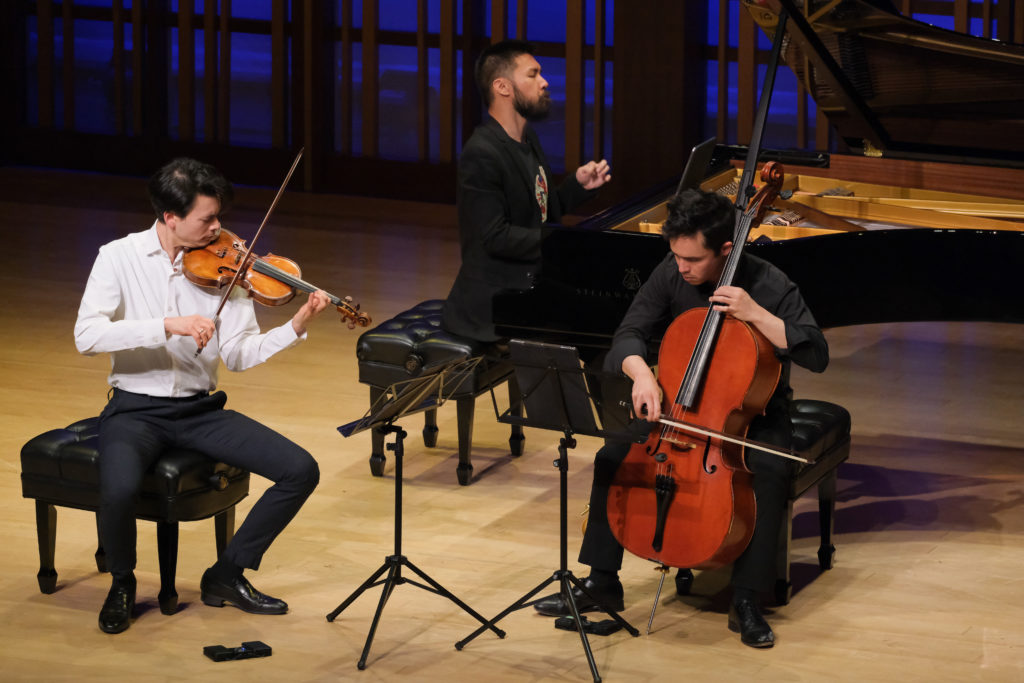The Junction Trio Makes Its Formidable Conrad Debut
The first week of May has proven to be a knockout for hearing chamber music in San Diego. On Thursday at the Mingei Museum in Balboa Park, the Camarada ensemble featured the music of Gilad Cohen, and Friday at All Souls’ Episcopal Church in Point Loma, The San Diego Bach Collegium performed the concert they will bring to Leipzig’s Bach Festival this June. Sunday afternoon at The Conrad in La Jolla, the Junction Trio performed a concert of John Zorn, Charles Ives, and Beethoven, and on Monday the JACK Quartet took up residence for UC San Diego’s ArtPower performance series with a program featuring works by Gabriela Smith and Caroline Shaw.
And no musician was busier than cellist Jay Campbell, who performed with Junction on Sunday and then went up the hill Monday to prepare for his Monday’s ArtPower performance with the JACK Quartet.And although it’s not chamber music, I cannot fail to mention that on Tuesday, cellist Yo-Yo Ma plays the Elgar Cello Concerto with the San Diego Symphony under Music Director Rafael Payare at the Civic Theatre.
At The Conrad, the Junction Trio—pianist Conrad Tao, violinist Stefan Jackiw, and cellist Jay Campbell—opened with John Zorn’s “Philosophical Investigations,” an exciting eleven-minute work written and premiered for the young musicians of the Junction Trio last year. Its spare texture sprinkled with islands of taut, explosive flourishes belies its highly charged emotional impact on the listener. Rapid bravura passages for each instrument alternate and occasionally overlap to form acidic atonal clusters that dissolve as quickly as they appear.
From Zorn’s opener, the Junction Trio jumped to Charles Ives’ 1915 Piano Trio, the vision of an American avant-garde composer whose complex idiom certainly did not sound 100 years removed from Zorn’s! Ives’ constantly changing textures and rhapsodic flashes suggested uncanny parallels, and, to be certain, the Junction Trio’s astounding finesse and immaculately focused sonority brought these works into surprising sonic compatibility.
Ives’ middle movement, a scherzo that speeds by at a breath-taking pace, evokes at times a Surreal circus occasionally interrupted by unexpected slow, mysterious transitions. When Ives is not shaking his fist at musical traditionalists, he writes delectable themes, such as the violin solo at the opening of the final movement, given poignant depth by Stefan Jackiw, followed by cellist Jay Campbell’s burnished cantabile solo. Tao fashioned an iridescent continuo of supple chromatic arpeggios throughout the movement, over which Jackiw and Campbell intoned Ives’ eerie account of that once popular Protestant hymn “Rock of Ages” as the work’s final benediction.
After Sunday’s intermission, the Junction Trio returned with Beethoven’s “Archduke” Piano Trio, Op. 97. Beethoven’s expansive, lofty 45-minute trio may not have the heroic character of the Seventh and Eighth Symphonies he was writing at the time he completed his “Archduke” Trio, but the Junction Trio’s masterful, intense account of this work riveted the La Jolla audience. I was particularly moved by the Junction Trio’s elegant traversal of the third movement, “Andante cantabile ma però con moto,” a captivating variation cycle based on a serene, almost hymn-like theme that Tao offered with understated command that the three musicians then developed with perceptive zeal.
This concert was presented by the La Jolla Music Society on May 5, 2024, at La Jolla’s Conrad Prebys Performing Arts Center.

Ken Herman, a classically trained pianist and organist, has covered music for the San Diego Union, the Los Angeles Times’ San Diego Edition, and for sandiego.com. He has won numerous awards, including first place for Live Performance and Opera Reviews in the 2017, the 2018, and the 2019 Excellence in Journalism Awards competition held by the San Diego Press Club. A Chicago native, he came to San Diego to pursue a graduate degree and stayed.Read more…

